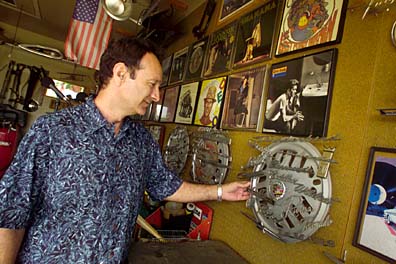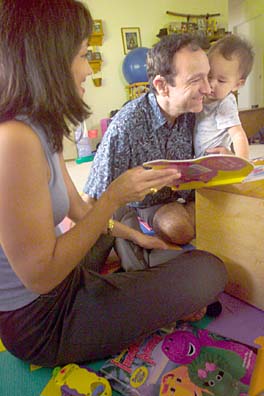
RICHARD WALKER / RWALKER@STARBULLETIN.COM
The Corey family gather to look over a picture book in their Ewa home. Ed Chevy, right, and his wife, Michiko, are hearing impaired, while their 1-year-old son Calvin has normal hearing. Here, they use a picture book to teach Calvin the sign for "crab."
Deaf family communicates
great love loud and clearThe Coreys bridge the gap between
the deaf and all who can hear
One-year-old Calvin Corey is learning his words in two languages at the same time.
When the Ewa Beach toddler says "Mommy" or "Daddy" or "ball" or "bottle" in English, his hands are in motion with American Sign Language expressions, too.
Calvin's hearing is 100 percent, but his mother, Michiko, hears only about 50 percent with the help of two hearing aids and his father, Ed, has about 80 percent hearing with one aid.
"I can hear Calvin just fine," said Michiko, who hasn't let a hearing handicap from a childhood accident be an impediment in life. She has been a secretary in personnel at Hickam Air Force Base for nine years and a federal employee for 15 years. An Aiea High School graduate, she was chosen Miss Deaf Hawaii in 1991.
"Much of signing is common sense," said Ed. "It's a beautiful language, like dancing in the air. Your feelings and inner expressions can come with body language, face expressions."
Born Ed Corey, he has entertained and taught for more than 30 years as Ed Chevy, a tag that stuck after a college friend complimented him, saying "you look like a '57 Chevy." He teaches American Sign Language at the Easter Seal Society Ewa office and classes on signing for music and storytelling at Kapiolani Community College.
Those are just the formal jobs. Chevy spends hours each month in community service aimed at getting the hearing community to understand and communicate with the hearing impaired, and to bolster deaf youngsters' skills and self-esteem.
His great love, beyond the family, is entertaining. Chevy is the bass player in Beethoven's Nightmare, a rock band of four deaf musicians who organized in the 1970s as students at Gallaudet University, a liberal arts college for the deaf. They rehearse on the mainland where the other three members live and perform at universities and small clubs. They plan an August concert in Honolulu.
"People find it hard to believe the deaf can play music," he said. "Hearing people play by ear, we listen to our hearts, we tap to keep in synch. We play our own compositions. A hearing musician helps us make sure the sound is right. He said we sound pretty heavy." Their visual showmanship includes signing gestures.
RICHARD WALKER / RWALKER@STARBULLETIN.COM
Ed Chevy has a neat collection of memorabilia in his garage. Here he talks about some vintage car emblems he got from his father who also was an avid collector. Behind him on the wall are vintage record albums. Chevy also plays bass in the rock band Beethoven's Nightmare, a band of hearing-impaired musicians.
It was the only deaf rock band in the world, as far as he knew, but then Chevy, with friends Steve Laracuente on guitar and Keoki Quijana on drums, formed a local version. "The What" -- the name reflects the usual response when someone hears it's an all-deaf band -- played for Calvin's April 5 birthday party at Masa's Catering. They are a hit in regular appearances at the Hawaii Center for the Deaf and the Blind.
"Ed Chevy is one of the leading inspirational figures in the deaf community to both adults and younger people," said Kathy Reimers, executive director of Hawaii Services on Deafness, a private agency that provides programs for schools and groups.
"He's a very creative performing artist. As a teacher, he is a role model for children, who see they can grow up and be like Ed, and for parents because it raises their expectations of what their child can grow up to be," Reimers said.
RICHARD WALKER / RWALKER@STARBULLETIN.COM
While looking over a picture book in their living room at their home in Ewa, Calvin Corey, 1, gives his dad Ed Chevy a hug as his mom, Michiko, looks on.
"It's wonderful to see Ed when he brings his son to many events, great to see the hearing child and deaf parent communicating. When you sign with a baby, you can sign before it can speak," said Reimers, who began communicating by signing with her son when he was 9 months old.
Chevy speaks in programs for hearing families with deaf children. "It is of enormous significance because it establishes a common communication link between families and their kids. About 85 percent of deaf kids' families never learn how to communicate with them."
"Ed's one of our bridge people," Reimers said. "With his talent, he can go out and help bridge the difference."
Chevy said "When a child is born deaf, a family can collapse. I tell them a child is not a crumbled piece of paper ... this child is special. I show families how to read with their child, at the same time signing to them so they will combine the word on paper with the sign.
"I go to elementary schools to bring awareness ... so they will talk to a deaf person. I show them a little signing song, have a sign language game. You have to come up with a sense of humor, and they'll remember. They will have it in back of their mind and be aware; when they get older they will remember."
That goal of awareness is not just a lesson plan for the teacher. "We've lived here for a few years and we still have neighbors who are uneasy about how to approach a deaf family. We feel they withdraw when they hear we're hearing impaired rather than try to talk with us."
Chevy's parents both suffered partial hearing loss from childhood diseases. A high fever at age 3 caused his partial impairment, and the same thing happened later to his sister and younger brother as young children.
His ease in taking the spotlight as musician and storyteller is a credit to his parents. His father was an original member of the National Theater of the Deaf in Berkeley, Calif., and his mother was a professional flamenco dancer.
Even so, it wasn't easy. "As a child, growing up in a hearing culture, I had to use good sportsmanship to win friends. I had to prove I'm really able to play ball and then they'd talk to me."
He met Michiko Abagnale when he coached her for her talent presentation in the 1991 Miss Deaf Hawaii competition. She did a signing interpretation of the Bette Midler song "From a Distance."
"When I lost hearing, it was hard on my dad," she said. "He didn't want me to use sign language." Not until she got Ed's help did she become fluent in the language: "I came a long way. We both did."
Working among people with full hearing, "I'm good one-on-one and in a small group, but in a staff meeting, I'm out," she said. "In a party, you won't see me initiate a conversation."
Reimers said Chevy, a board member of Hawaii Services on Deafness, was founder and is "a guiding force of the Sign Language Festival, the only major celebration of language, arts and culture of the deaf community. Ed and the band are a signature group showing how they can take their art out into the wider community." The biennial event will be held Aug. 16 at McCoy Pavilion.
"Some people are stuck with a stereotype of us," Chevy said. "There is no limit. We can do anything ... but hear."


